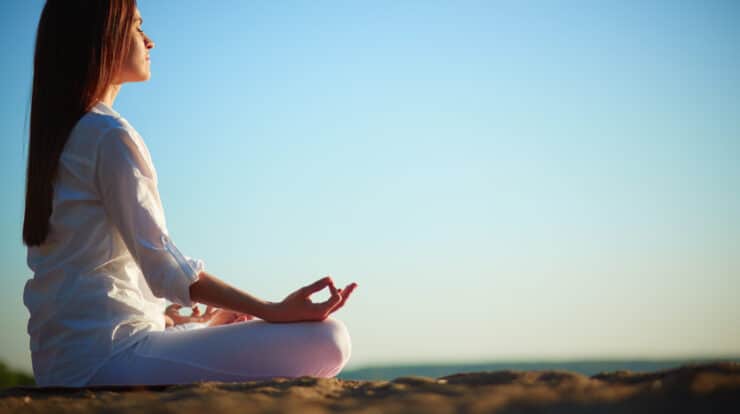
Welcome to the world of the Psoas Muscle and Emotions. This is a little-known muscle that is a vital component of your body, it connects physical, emotional, and spiritual well-being. In this article, you will unravel the mysteries of this deep-seated muscle and discover its profound impact on your overall health.
Overview of the Psoas Muscle
The Psoas Muscle, also known as the Iliopsoas, is one of the most important muscles in the human body. Located deep within the abdomen, it connects the spine to the legs, playing a crucial role in movement and stability. This muscle acts as a bridge, allowing you to walk, run, and perform various activities with ease.
Importance of the Psoas Muscle in Overall Well-Being
Beyond its mechanical functions, the Psoas Muscle has a profound influence on your well-being. Its position in the core of your body makes it a physical and energetic center. When properly aligned and functioning optimally, the Psoas contributes to good posture, balanced movement, and efficient body mechanics. Additionally, this muscle has been linked to emotional and spiritual well-being, as tension or weakness in the Psoas can manifest as emotional stress or blocked energy.
Understanding the importance of the Psoas Muscle can empower you to take control of your physical, emotional, and spiritual health. By learning how to release tension and strengthen this muscle, you can experience greater mobility, improved posture, and a profound sense of well-being.
So, embark on this journey of self-discovery as we explore the depths of the Psoas Muscle and unlock its incredible potential for your overall health and vitality.
The Anatomy of the Psoas Muscle
The psoas muscle, also known as the “vital” psoas, is a significant muscle connecting physical, emotional, and spiritual well-being. In this section, we will explore the anatomy of this essential muscle, understanding its location, structure, composition, functions, and movements.
Location of the Psoas Muscle
The psoas muscle is situated deep within the core region of your body. It originates from the lumbar vertebrae (T12-L5) and spans across the pelvis, attaching to the lesser trochanter of the femur. This positioning allows the psoas muscle to play a crucial role in stabilizing the spine while facilitating movement in the hip joint.
Structure and Composition of the Psoas Muscle
The psoas muscle is long and cylindrical, extending from the lumbar vertebrae to the upper thigh bone. It is composed mainly of type I muscle fibers, providing endurance and postural support. Surrounding the muscle fibers are connective tissues, blood vessels, and nerves, ensuring efficient functioning and communication within the muscle.
Functions and Movements of the Psoas Muscle
The primary functions of the psoas muscle include flexing the hip joint, internally rotating the thigh, and stabilizing the spine during movement. As you walk, run, or perform various physical activities, the psoas muscle acts as a powerful hip flexor, lifting the leg forward while maintaining stability in the lower back and pelvis.
Understanding the anatomy of the psoas muscle is crucial for appreciating its role in physical, emotional, and spiritual well-being. By maintaining its health and function, you can optimize your overall well-being and unlock the potential benefits that this vital muscle offers.
Physical Well-Being and the Psoas Muscle
The psoas muscle plays a crucial role in connecting physical, emotional, and spiritual well-being. Understanding the significance of this muscle can help you improve your overall physical well-being.
Role of the Psoas Muscle in Posture and Stability
The psoas muscle is located deep within your core and is responsible for maintaining proper posture and stability. It connects your lower back, pelvis, and legs, enabling you to stand, walk, and engage in various physical activities. A healthy psoas muscle supports the spine, preventing excessive curvatures and promoting good alignment.
Importance of a Healthy Psoas Muscle for Mobility
Having a supple and strong psoas muscle is essential for maintaining optimal mobility. It allows you to move freely and effortlessly, engaging in activities such as bending, lifting, and running. A well-functioning psoas muscle contributes to fluid movements and prevents stiffness, discomfort, and the risk of injury.
Common Physical Issues related to the Psoas Muscle
When the psoas muscle becomes tight or weak, it can lead to several physical issues. These may include lower back pain, hip stiffness, limited range of motion, and difficulties with balance. Additionally, a dysfunctional psoas muscle can affect the functioning of surrounding muscles and joints, potentially causing further imbalances and discomfort.
Understanding the role of the psoas muscle in physical well-being is crucial for maintaining a healthy and pain-free body. By prioritizing the strength and flexibility of this muscle, you can enhance your posture, stability, and overall mobility. Keep in mind the importance of a balanced exercise routine that includes specific stretches and exercises to target the psoas muscle and promote its optimal function.
Emotional Well-Being and the Psoas Muscle
The Vital Psoas Muscle plays a crucial role in connecting physical, emotional, and spiritual well-being. In this section, we will explore the intricate relationship between the Psoas Muscle and emotions. Understanding this connection can provide valuable insights into managing emotional well-being and finding balance in your life.
Connection between the Psoas Muscle and Emotional Health
Did you know that the Psoas Muscle is directly linked to your emotional state? It acts as a messenger between your body and mind, influencing your overall emotional well-being. When the Psoas Muscle is tight or contracted, it can disrupt the flow of energy throughout your body, leading to emotional imbalances such as anxiety, stress, and even depression.
The Psoas Muscle and the Fight-or-Flight Response
The Psoas Muscle plays a significant role in the fight-or-flight response, which is our body’s natural reaction to stress or danger. When you perceive a threat, your Psoas Muscle contracts, preparing your body for action. However, if this muscle remains constantly tense due to chronic stress, it can lead to heightened emotional responses and an inability to relax.
Releasing Emotional Tension through the Psoas Muscle
Fortunately, there are techniques and exercises that can help release emotional tension stored in the Psoas Muscle. Gentle stretching, massage, and deep breathing exercises can all contribute to relaxing and lengthening the Psoas, facilitating emotional release. By regularly practicing these methods, you can enhance emotional well-being and promote a sense of calm and balance.
Understanding the profound connection between the Psoas Muscle and emotional well-being empowers you to take proactive steps towards nurturing your emotional health. By listening to your body and implementing practices that support a healthy Psoas Muscle, you can cultivate emotional resilience and create a more harmonious mind-body connection.
Spiritual Well-Being and the Psoas Muscle
The psoas muscle, known as the body’s “fight or flight” muscle, plays a critical role not only in our physical well-being but also in our emotional and spiritual states. As the primary flexor of the hip joint, the psoas is directly connected to our deepest core muscles and affects our posture, overall stability, and movement. However, its significance reaches far beyond the physical realm.
The Psoas Muscle as a Center of Energy
In various spiritual practices, the psoas muscle is considered to be a center of energy in the body. It is believed to hold and release deep-seated emotional and energetic blockages, making it instrumental in our emotional healing and spiritual growth. By focusing on the psoas, you can access and release emotional tensions and traumas trapped in this muscle, leading to a profound sense of well-being.
The Psoas Muscle and the Energetic Body
In addition to its role as an energy center, the psoas muscle is also closely linked to the energetic body. In yogic and energetic traditions, it is believed that the psoas muscle is connected to the three lower chakras, which govern our sense of security, relationships, and personal power. By working with the psoas, you can harmonize and balance these energy centers, leading to a deeper connection with yourself and a sense of empowerment.
Exploring the Spiritual Connection to the Psoas Muscle
To explore the spiritual connection to the psoas muscle, you can incorporate practices such as mindful stretching, deep breathing, and meditation. By consciously engaging with this powerful muscle, you can tap into its energetic potential and unlock a sense of spiritual well-being that transcends the physical. Through regular practice and awareness, you can harness the transformative power of the psoas to enhance your overall spiritual journey.
Maintaining a Healthy Psoas Muscle
The health of your psoas muscle is integral to your overall well-being. This mighty muscle, located deep within your core, not only supports your physical body but also plays a significant role in your emotional and spiritual health. To ensure the longevity and functionality of this vital muscle, it is important to incorporate various practices into your daily routine.
Stretching and Strengthening Exercises for the Psoas Muscle
Engaging in regular stretching and strengthening exercises can help maintain the flexibility and strength of your psoas muscle. Specific exercises such as lunges, yoga poses like the warrior series, and psoas stretches can target and invigorate this important muscle group. By incorporating these exercises into your fitness routine, you can keep your psoas muscle supple and strong.
Proper Posture and Body Mechanics to Support the Psoas Muscle
Maintaining proper posture and employing correct body mechanics can prevent unnecessary strain on the psoas muscle. Practices such as sitting with a neutral spine, avoiding excessive slouching, and lifting objects using your leg muscles rather than your back can alleviate stress on this crucial muscle. By adopting such habits, you can minimize the risk of psoas muscle imbalances and injury.
Self-Care Practices for the Psoas Muscle
Implementing self-care practices specifically tailored for the psoas muscle is essential for its well-being. Techniques such as self-massage, foam rolling, and myofascial release can help release tension and restore balance to this deep muscle. Additionally, incorporating stress-reducing activities such as meditation and deep breathing can further support the health and vitality of your psoas muscle.
Incorporating these practices into your daily routine will not only ensure the physical health of your psoas muscle but also contribute to your emotional and spiritual well-being. By nurturing this vital muscle, you can maintain balance and harmony in all aspects of your life.
Common Injuries and Conditions Affecting the Psoas Muscle
The psoas muscle is a vital muscle that not only connects the upper and lower body but also plays a significant role in physical, emotional, and spiritual well-being. As such, it is essential to understand the common injuries and conditions that can affect this crucial muscle.
Psoas Muscle Strain and Tears
Psoas muscle strain and tears are relatively common and often occur due to activities that require repetitive hip flexion or sudden movements. Symptoms include pain in the hip or groin area, difficulty walking or standing, and a decreased range of motion. Rest, ice, and physical therapy are usually recommended for recovery.
Psoas Muscle Tendinitis
Psoas muscle tendinitis refers to inflammation of the tendons surrounding the psoas muscle. It is typically caused by overuse or repetitive activities, leading to pain and discomfort in the front of the hip or lower back. Treatment involves rest, physical therapy, and anti-inflammatory medications.
Iliopsoas Bursitis
Iliopsoas bursitis occurs when the bursa, a fluid-filled sac that reduces friction between tendons and bones, becomes inflamed. This condition can lead to pain and tenderness in the hip and groin area, as well as difficulty walking or sitting for extended periods. Treatment involves rest, ice, physical therapy, and occasionally, corticosteroid injections.
Understanding these common injuries and conditions affecting the psoas muscle is crucial for maintaining its health and function. By recognizing the symptoms and seeking appropriate treatment, you can ensure that your psoas muscle remains a vital connector for your physical, emotional, and spiritual well-being.
Conclusion of Psoas Muscle and Emotions
Appreciating the Vital Role of the Psoas Muscle in Well-Being
In conclusion, the psoas muscle plays a crucial role in the overall well-being of an individual. Its architectural design and strategic placement allow it to connect physical, emotional, and spiritual aspects of our lives. By understanding the functions and significance of the psoas muscle, you can cultivate a deeper appreciation for its vital role in your overall health.
Integrating Physical, Emotional, and Spiritual Health through the Psoas Muscle
By recognizing the interconnectedness of physical, emotional, and spiritual well-being, you can work towards achieving optimal health and balance. The psoas muscle serves as a bridge connecting these different realms, enabling you to achieve a profound level of harmony within yourself.
Physically, caring for your psoas muscle through proper exercise and stretching can improve posture, alleviate back pain, and promote overall body alignment. Emotionally, the psoas muscle is closely linked to stress and trauma. By addressing and releasing emotional tension stored within the muscle, you can experience emotional healing and increased resilience.
Furthermore, the psoas muscle has been associated with our spiritual well-being. Its location in the body’s core is believed to be a source of inner power and intuition. Engaging in practices such as meditation and breathwork can help activate and connect with the spiritual energy held within the psoas muscle.
In summary, the psoas muscle goes beyond its physical function. It holds the potential to unite our physical, emotional, and spiritual selves, contributing to a fuller, more balanced state of well-being. Embracing the role of the psoas muscle in our lives allows us to cultivate a holistic approach to health, enabling us to thrive both physically and spiritually. So, take care of your psoas muscle and unlock the profound potential it holds for your overall well-being.




